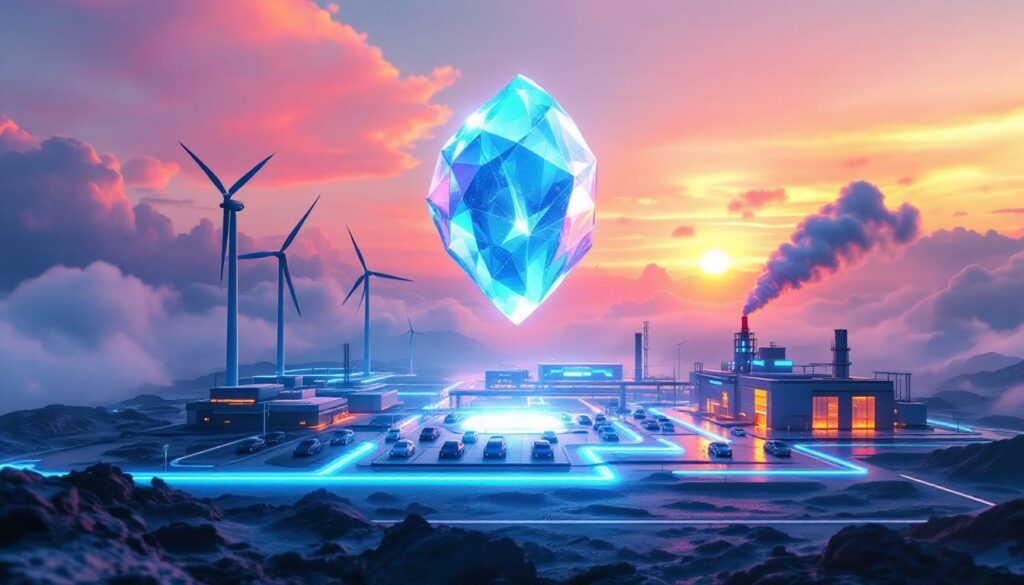How Does Vulcan Energy's Financing Package Support the Lionheart Project?
Vulcan Energy has secured a substantial financial foundation for its ambitious Lionheart Project with approximately €104 million ($121.8 million) in grants for its Clean Lithium for Battery Cell Production project (Li4BAT). These funds represent a critical cornerstone of the company's comprehensive financing strategy for its phase one operations in Germany.
The financing package is impressively diverse, comprising several key components beyond the Li4BAT grants. It includes an additional €100 million specifically allocated for renewable heating infrastructure, a financing envelope of up to €500 million approved by the European Investment Bank, and ongoing negotiations for a €150 million investment from the Raw Materials Fund (RMF).
"We welcome this strong, tangible support from the German Federal Government, and the state governments of Rhineland-Palatinate and Hesse," noted Cris Moreno, Vulcan Energy's CEO. "The Li4BAT grant will enable our project to supply sustainable, domestically sourced lithium to the German and European battery EV markets."
The Li4BAT grants follow a carefully structured disbursement schedule, being distributed proportionally over 36 months beginning with eligible expenditures starting in October 2025. This approach ensures continuous financial support throughout the critical development phases rather than providing a single lump sum that might be quickly depleted.
Financial Structure Highlights:
- €104 million ($121.8 million) in Li4BAT grants from German Federal Government and states
- €100 million in renewable heating grants
- Up to €500 million approved by the European Investment Bank
- Potential €150 million from the Raw Materials Fund under negotiation
This multi-layered financial strategy demonstrates the strong government backing for the project while diversifying funding sources to minimize risk exposure and ensure project continuity.
What Are the Key Components of Vulcan's Lithium Production Infrastructure?
The Li4BAT grants will fund two essential facilities that form Vulcan's integrated lithium production ecosystem. This dual-facility approach creates a complete domestic supply chain, handling the entire process from extraction to final processing within Germany's borders.
Geothermal Lithium Extraction Plant (G-LEP)
Located in Landau, Rhineland-Palatinate, the G-LEP represents the initial phase of lithium production. This facility's primary function is the extraction and preliminary processing of lithium raw materials directly from geothermal lithium extraction. What makes this operation particularly notable is its utilization of geothermal energy not only as the source of lithium but also as the power source for the extraction process itself.
The G-LEP exemplifies circular economy principles by:
- Harnessing renewable geothermal energy for extraction operations
- Minimizing environmental footprint compared to conventional open-pit mining
- Creating a sustainable, continuous extraction process with lower water consumption
- Reducing land disturbance typically associated with traditional lithium mining
Central Lithium Plant (CLP)
Situated in Frankfurt, Hesse, the CLP completes the value chain by specializing in lithium hydroxide processing. This facility takes the raw lithium materials from the G-LEP and refines them into battery-grade lithium hydroxide that meets the exacting specifications required for electric vehicles impact on battery production.
The strategic positioning of the CLP in Frankfurt offers several advantages:
- Proximity to transportation infrastructure for efficient distribution
- Access to skilled workforce in Germany's financial center
- Potential integration with nearby manufacturing facilities
- Reduced transportation emissions between extraction and processing
Together, these facilities create a vertically integrated production system that significantly reduces supply chain complexity while enhancing security of supply for European battery manufacturers.
Why Is This Project Strategically Important for European Battery Supply Chains?
Strengthening European Raw Material Independence
The Lionheart Project directly addresses Europe's vulnerability in critical raw materials supply, particularly for lithium which has been identified as a strategic priority under the European Commission's Critical Raw Materials Act. As global competition for battery materials intensifies, this project provides a crucial step toward supply chain resilience.
The strategic importance extends beyond mere supply security to encompass several critical objectives:
- Reducing geopolitical vulnerability: Decreasing dependence on lithium imports from regions with unpredictable political environments
- Enhancing industrial sovereignty: Creating a domestic supply chain for materials essential to Europe's automotive future
- Supporting industrial transformation: Facilitating the transition of Europe's automotive sector to electric mobility
- Strengthening economic competitiveness: Positioning European manufacturers to compete in the growing EV market
"Lithium is the lifeblood of the energy transition strategy and for EV production and is crucial to transitioning Germany and Europe's auto industry into the electric age," emphasized Vulcan CEO Cris Moreno.
Environmental and Sustainability Advantages
The project's environmental profile represents a significant departure from conventional lithium production methods, offering substantial sustainability benefits:
- Reduced carbon footprint: The geothermal extraction process produces minimal CO₂ compared to hard-rock mining or evaporative ponds
- Decreased water usage: Unlike South American brine operations which consume massive water resources in arid regions
- Minimal land disturbance: Extraction occurs through wells rather than open pits or large evaporation ponds
- Alignment with EU Green Deal: Supports Europe's ambition to lead in sustainable industrial practices
These environmental advantages position Vulcan's lithium as a premium product for manufacturers focused on minimizing the carbon intensity of their supply chains – an increasingly important consideration as automotive companies face pressure to reduce Scope 3 emissions.
What Conditions Must Be Met for Grant Disbursement?
The Li4BAT grants come with specific performance conditions that Vulcan must satisfy to receive the full funding allocation. These conditions establish a clear timeline for project advancement and ensure accountability for the public investment.
| Condition | Deadline | Status |
|---|---|---|
| Finalize overall phase one financing package | September 1, 2025 | In progress |
| Begin construction | January 2026 | Planned |
| Complete Raw Materials Fund equity investment | March 31, 2026 | Negotiations ongoing |
These milestone-based requirements create a structured framework for project development while allowing government stakeholders to monitor progress. The conditions reflect the German government's commitment to ensuring public funds are deployed effectively and that the project advances according to schedule.
Financing Milestone Requirements:
- The company must complete its entire phase one financing package, integrating public grants with private capital
- Physical construction must commence by early 2026, demonstrating tangible project progress
- The Raw Materials Fund investment must be finalized within the specified timeframe
Failure to meet these conditions could potentially impact the disbursement schedule or total grant amounts, highlighting the importance of adherence to the development timeline.
How Does This Project Impact the European EV Industry?
Creating a Domestic Battery Materials Ecosystem
The Lionheart Project represents a crucial piece in Europe's emerging battery value chain, addressing a critical gap between raw material supply and manufacturing capacity. As European automakers accelerate electrification plans, having a secure, local source of lithium becomes increasingly strategic.
The project contributes to building a comprehensive European battery ecosystem through:
- Supply chain localization: Providing battery-grade lithium hydroxide produced within EU borders
- Reducing logistics complexity: Minimizing transportation distances between material source and battery production
- Enhancing supply security: Decreasing vulnerability to global supply chain disruptions
- Creating high-skilled employment: Generating jobs in the clean energy and advanced materials sectors
For European automakers racing to meet increasingly stringent emissions targets, having reliable access to domestically-produced lithium removes a significant supply chain risk factor.
Accelerating the Energy Transition
The significance of this project extends beyond industrial policy to directly support Europe's broader energy transition and climate objectives. By enabling increased EV production through secure lithium supply, the project helps accelerate the shift away from fossil fuel transportation.
The project directly supports Europe's transition from internal combustion engines to electric vehicles by:
- Ensuring material availability: Providing a critical component for battery production at scale
- Supporting emissions reduction: Enabling the expansion of zero-emission vehicle fleets
- Enhancing energy security: Reducing dependency on petroleum imports
- Creating circular economy opportunities: Establishing foundation for future battery recycling initiatives
This alignment with broader climate and industrial policy objectives explains the substantial public financial support the project has received.
What Previous Financing Steps Has Vulcan Taken?
In December 2024, Vulcan launched a €100 million placement to finance the initial stages of phase one of the Lionheart Project. This early financing round demonstrated market confidence in the project and provided capital for preliminary development activities, according to Vulcan Energy's latest project update.
The company has strategically built its financing approach through multiple channels, creating a diversified funding structure that balances public support with private investment. This approach helps distribute risk while leveraging both government backing and commercial funding sources.
Key financing elements include:
- Public grants from federal and state governments
- European Investment Bank support
- Private capital raises
- Potential strategic partnerships with industry stakeholders
This multi-faceted financing strategy reflects the project's position at the intersection of public policy priorities and commercial opportunity. By securing support from both government and private sources, Vulcan creates a more resilient financial foundation for the project's development.
What Is the Timeline for Project Development?
Based on the grant conditions and company statements, the Lionheart Project is expected to follow a structured development timeline that aligns with European targets for battery material self-sufficiency.
Key timeline milestones include:
- Financing package finalization: By September 1, 2025
- Eligible expenditures commencement: October 2025
- Construction start: January 2026
- Raw Materials Fund investment completion: By March 31, 2026
- Grant disbursement period: 36 months from October 2025
- Production target: Likely 2027-2028 based on construction timeline
This development schedule positions the project to begin contributing to European lithium supply by the latter part of the decade, aligning with projected growth in European EV production and battery manufacturing capacity.
The timeline reflects a realistic development pathway for a complex industrial project of this nature, with appropriate intervals between financing, construction, and production phases. The grant disbursement structure, spanning 36 months, acknowledges the extended development period required.
How Does This Project Compare to Other European Lithium Initiatives?
Competitive Advantages
Vulcan's Lionheart Project distinguishes itself within the emerging European lithium landscape through several notable competitive advantages:
- Integrated renewable energy: Unlike many competitors, the project incorporates geothermal energy directly into the extraction process
- Domestic location: Positioned within Germany, Europe's largest automotive market, providing logistical advantages
- Strong government backing: Secured substantial financial support from multiple levels of government
- Dual-facility approach: Spanning two German states, creating regional economic benefits
- Comprehensive financing strategy: Involving multiple stakeholders across public and private sectors
These factors position the project favorably within the European lithium development landscape, where multiple initiatives are racing to establish production capacity amid growing demand from the battery sector.
The project's location within Germany provides particular strategic value, given the country's position as Europe's automotive manufacturing center and its ambitious electrification targets. This proximity to end users reduces both transportation costs and supply chain complexity compared to more geographically distant European lithium projects such as the Thacker Pass lithium mine in the United States.
What Are the Broader Implications for Critical Minerals Development in Europe?
Creating a Blueprint for Domestic Resource Development
The Lionheart Project and its financing structure establish a potential model for developing other critical mineral resources within Europe, potentially influencing approaches to securing materials like nickel, cobalt, manganese, and rare earth elements.
The project demonstrates several elements that could serve as a blueprint for future mining investment insights:
- Effective public-private partnership approaches: Balancing government support with commercial investment
- Multi-level government coordination: Aligning federal and state resources toward strategic objectives
- Integration of sustainability principles: Incorporating environmental considerations from project inception
- Value chain integration: Creating connected infrastructure from extraction to processing
As Europe seeks to reduce dependency on imported critical minerals across multiple categories, the financing and development model pioneered by this project could inform similar initiatives for other materials essential to the clean energy transition.
The project also highlights the growing recognition among European policymakers that securing domestic supplies of strategic materials represents both an economic opportunity and a matter of industrial security in an increasingly competitive global landscape.
FAQs About Vulcan Energy's Lithium Project Grants
What is the total value of grants received by Vulcan Energy?
Vulcan Energy has secured approximately €104 million ($121.8 million) in grants specifically for its Clean Lithium for Battery Cell Production project (Li4BAT), which forms part of a larger financing package for the Lionheart Project.
Who provided the grant funding?
The grants were provided by the German Federal Government and the state governments of Rhineland-Palatinate and Hesse, demonstrating multi-level governmental support for the project.
What is the Raw Materials Fund's role in this project?
Vulcan is currently negotiating a €150 million investment from the Raw Materials Fund, which is expected to be the "final cornerstone" of the phase one Lionheart financing in the second half of 2025.
When will construction of the project begin?
According to the grant conditions, construction must begin by January 2026 for Vulcan to receive the full grant allocation.
How will the lithium be extracted?
The lithium will be extracted using geothermal energy at the Geothermal Lithium Extraction Plant (G-LEP) in Landau, Rhineland-Palatinate, representing a more sustainable approach than traditional mining methods.
Ready to Gain Early Access to Major ASX Mineral Discoveries?
Don't miss out on the next transformative discovery like Vulcan Energy's lithium project – let Discovery Alert's proprietary Discovery IQ model analyse ASX announcements and deliver instant notifications on high-potential opportunities directly to your inbox. Explore how past discoveries have generated substantial returns by visiting the Discovery Alert discoveries page today.




